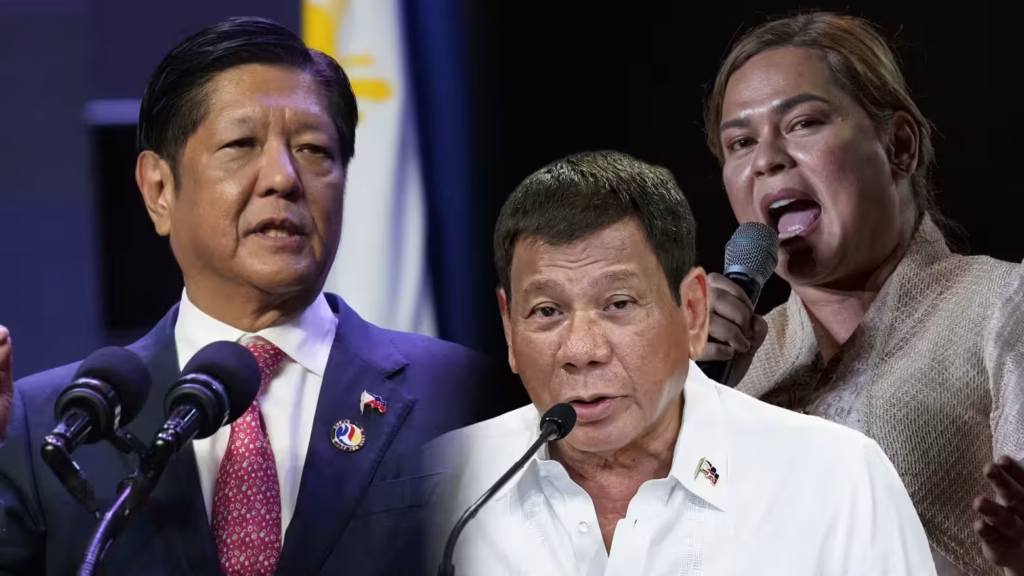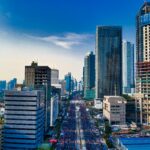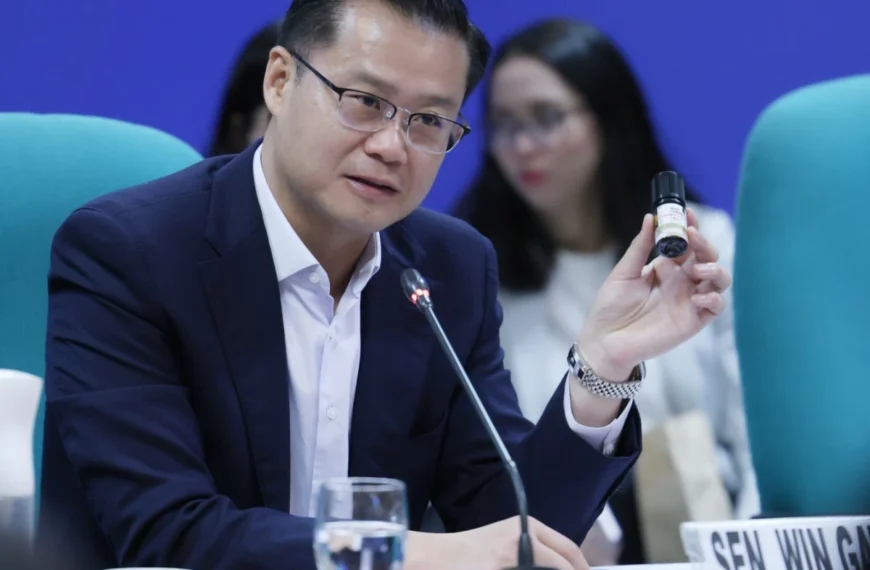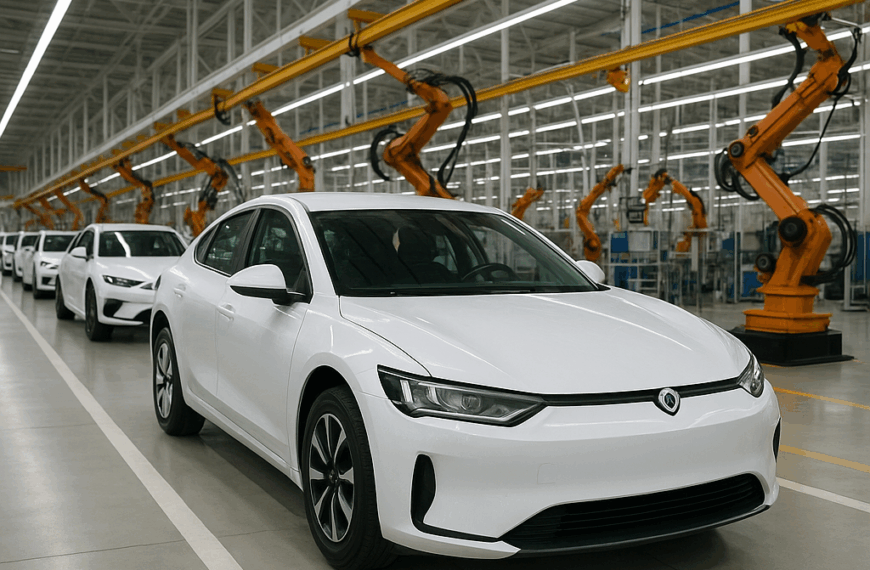The Dutertes Won’t Bow Out Quietly: What the Philippine Election Reveals

- (Photo by AP and Getty Images)
The Philippines’ 2025 midterm elections could have signaled a turning point for the long-dominant Duterte political dynasty. In March, the family’s patriarch—80-year-old former President Rodrigo Duterte—was arrested by the International Criminal Court on allegations of crimes against humanity. Meanwhile, his daughter and political heir, Vice President Sara Duterte-Carpio, was impeached by the House of Representatives in February on charges that include corruption and allegedly threatening to kill her political rival, President Ferdinand “Bongbong” Marcos Jr. She is set to face trial in the Senate later this year.
Instead, preliminary results suggest the election marked a political comeback for the Dutertes. On Monday, despite extreme heat, tens of millions of Filipinos cast their votes for around 18,000 national and local positions across the country.
In Davao City—a longtime Duterte stronghold—former President Rodrigo Duterte and his youngest son, Sebastian, were elected mayor and vice mayor, respectively. Rodrigo previously held the mayoralty for over 22 years before his presidency in 2016. With Rodrigo currently detained in The Hague, Sebastian is expected to assume the responsibilities of the mayor’s office.
In the Senate—where Sara Duterte’s impeachment trial will take place—key allies of the Duterte family secured strong re-election victories. Among them were Christopher “Bong” Go, Rodrigo Duterte’s longtime aide, who topped the senatorial race, and Ronald dela Rosa, the former national police chief during Duterte’s controversial drug war, who placed third overall. Both senators, who also face potential arrest by the ICC, were vocal defenders of the drug war during their first terms. Joining them in the upper chamber is Rep. Rodante Marcoleta, another Duterte loyalist from the House of Representatives, who has previously vowed to defend Sara against impeachment.
While some critics had hoped that a defeat at the polls—on top of the legal and political setbacks the Dutertes faced ahead of the election—would finally diminish the family’s political clout, experts say the results suggest otherwise. Instead, the Dutertes appear to have reaffirmed their powerful grip on Philippine politics. “You’re talking about a president who was more popular when he left office than when he entered it,” says Aries Arugay, chair of the political science department at the University of the Philippines.
Rodrigo Duterte’s bloody drug war drew international condemnation, much like similar campaigns in Colombia, Mexico, and Thailand. Yet, Arugay notes, it also gained strong domestic support “because of their visuality and their ability to sow fear, which is often a proxy for effectiveness.”
At first, Emily Soriano’s family couldn’t believe the news of Rodrigo Duterte’s shocking arrest on March 11. Like many other Filipino families, they held back their sense of relief until Duterte was flown to the Netherlands later that day to face charges tied to his violent anti-drug campaign, which human rights groups say claimed over 30,000 lives.
Soriano’s 15-year-old son was one of seven people killed in Caloocan, Metro Manila, in December 2016 as part of that campaign. “Since 2017, we’ve been calling for an end to the killings and for Duterte and the police to be held accountable,” Soriano told TIME through tears. “That call hasn’t been in vain,” she added.
Rodrigo Duterte’s arrest was far from guaranteed. For years, he and his allies had resisted the International Criminal Court’s efforts to hold him accountable. But as tensions escalated between the Dutertes and the influential Marcos family—who have their own authoritarian legacy—the political landscape shifted. Rodrigo and President Marcos Jr. have openly clashed over both foreign and domestic policy, trading barbs and even accusations of drug use, while Sara Duterte has increasingly signaled her ambition to run for president in 2028. In this climate of growing rivalry, the Marcos-led government and its allies appeared less inclined to shield the controversial Duterte clan—despite their once-strategic alliance that helped secure Marcos Jr.’s 2022 presidential victory.
As Emily Soriano awaits the International Criminal Court’s verdict on Rodrigo Duterte, she acknowledges that the prospect of the Duterte family regaining power still hangs heavily over the country. While some had hoped Duterte’s arrest would signal the decline of his political dynasty, the midterm election results suggest otherwise.
“This is not the end,” Vice President Sara Duterte-Carpio declared in a post-election statement. “It’s a renewed beginning.” She portrayed her family’s and their allies’ strong performance at the polls as the launch of an opposition movement against the Marcos administration. “We will continue to hold the government accountable, advocate for the issues that matter, and work tirelessly to serve as a strong and constructive opposition,” she added.
For President Marcos, the remaining years of his term are likely to be defined by deepening divisions and mounting political challenges. Once enjoying widespread popularity, his approval ratings have declined—due in part to his administration’s handling of domestic concerns like the rising cost of living and persistent corruption, but also significantly because of an escalating feud with the Duterte political camp. The Dutertes and their allies have framed both Sara Duterte’s impeachment and Rodrigo Duterte’s arrest as politically motivated moves, using them to galvanize support—particularly in Mindanao, a longstanding Duterte stronghold.
Vice President Sara Duterte’s public approval ratings rose following her father’s arrest, and Duterte-aligned senatorial candidates such as Bong Go and Ronald dela Rosa also experienced gains in opinion polls. “Their supporters weren’t particularly vocal before the arrest,” notes political scientist Aries Arugay.
Manila-based political analyst Richard Heydarian, who teaches at the University of the Philippines, suggests that part of the surge in support may also be linked to coordinated disinformation efforts. In April, Reuters reported that a network of social media accounts emerged shortly after Rodrigo Duterte’s arrest, amplifying praise for the Dutertes while attacking the ICC and the Marcos administration. Israel-based tech firm Cyabra, which uncovered the network, told Reuters that the disinformation campaigns “shaped the conversation” leading up to the elections.
Still, both the Dutertes and the Marcoses face a challenging road ahead. While the next major electoral contest—the 2028 presidential race—is still years away, the immediate political battleground will be the Senate, which reconvenes in June. Despite significant wins for the Dutertes—including support from Marcos Jr.’s own sister, Imee Marcos, who broke ranks with her family and is poised to secure a Senate seat—Marcos-aligned candidates appear to have held onto six of the 12 contested seats in the 24-member chamber.
Public opinion polls consistently indicate that Sara Duterte is the preferred choice of most Filipinos to succeed Marcos in the 2028 presidential race. However, a conviction through impeachment—which requires a two-thirds majority—would permanently bar her from holding public office under Philippine law.
For people like Emily Soriano, though, the election is about more than political maneuvering or which family holds formal power—it’s about how that power will be exercised. She fears that Duterte’s allies in office are “likely to continue what Duterte left behind.”
- SOURCES:
https://time.com/7266779/philippines-duterte-arrest-icc-warrant
https://time.com/6588859/sara-duterte-philippines-president-2028-polls
https://time.com/6965183/ferdinand-bongbong-marcos-2
https://www.sunstar.com.ph/davao/marcoleta-vows-to-defend-sara-against-impeachment
https://time.com/6339873/rodrigo-duterte-drug-war-international-criminal-court-investigation
https://time.com/6257017/philippines-bongbong-marcos-people-power-revolution
https://time.com/6966214/rodrigo-duterte-philipipines-south-china-sea-us-marcos
https://time.com/6835896/philippines-marcos-constitution-amend-charter-change-plan-controversy
https://time.com/6589948/philippines-rodrigo-duterte-ferdinand-marcos-drug-accusations
https://time.com/6339369/philippines-marcos-duterte-drug-war-icc-probe
https://time.com/6119256/duterte-election-philippines-dynasty
https://time.com/6174767/bongbong-marcos-election-philippines-result
https://time.com/6162028/bongbong-marcos-philippines-president-popular
https://time.com/6588859/sara-duterte-philippines-president-2028-polls












